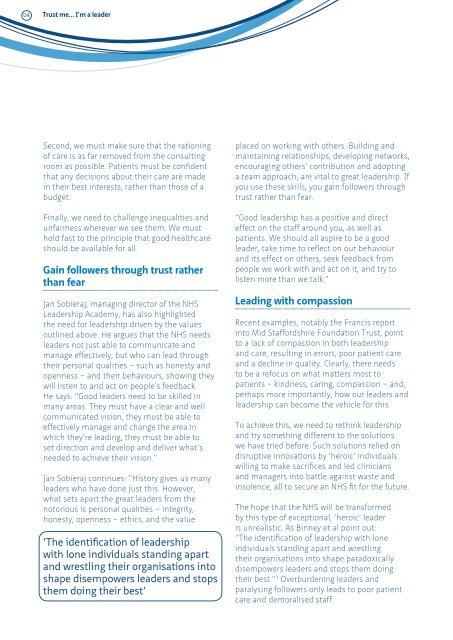trust-me-im-a-leader
trust-me-im-a-leader
trust-me-im-a-leader
Create successful ePaper yourself
Turn your PDF publications into a flip-book with our unique Google optimized e-Paper software.
04<br />
Trust <strong>me</strong>... I’m a <strong>leader</strong><br />
Second, we must make sure that the rationing<br />
of care is as far removed from the consulting<br />
room as possible. Patients must be confident<br />
that any decisions about their care are made<br />
in their best interests, rather than those of a<br />
budget.<br />
Finally, we need to challenge inequalities and<br />
unfairness wherever we see them. We must<br />
hold fast to the principle that good healthcare<br />
should be available for all.<br />
Gain followers through <strong>trust</strong> rather<br />
than fear<br />
Jan Sobieraj, managing director of the NHS<br />
Leadership Academy, has also highlighted<br />
the need for <strong>leader</strong>ship driven by the values<br />
outlined above. He argues that the NHS needs<br />
<strong>leader</strong>s not just able to communicate and<br />
manage effectively, but who can lead through<br />
their personal qualities – such as honesty and<br />
openness – and their behaviours, showing they<br />
will listen to and act on people’s feedback.<br />
He says: “Good <strong>leader</strong>s need to be skilled in<br />
many areas. They must have a clear and well<br />
communicated vision, they must be able to<br />
effectively manage and change the area in<br />
which they’re leading, they must be able to<br />
set direction and develop and deliver what’s<br />
needed to achieve their vision.”<br />
Jan Sobieraj continues: “History gives us many<br />
<strong>leader</strong>s who have done just this. However,<br />
what sets apart the great <strong>leader</strong>s from the<br />
notorious is personal qualities – integrity,<br />
honesty, openness – ethics, and the value<br />
‘The identification of <strong>leader</strong>ship<br />
with lone individuals standing apart<br />
and wrestling their organisations into<br />
shape disempowers <strong>leader</strong>s and stops<br />
them doing their best’<br />
placed on working with others. Building and<br />
maintaining relationships, developing networks,<br />
encouraging others’ contribution and adopting<br />
a team approach, are vital to great <strong>leader</strong>ship. If<br />
you use these skills, you gain followers through<br />
<strong>trust</strong> rather than fear.<br />
“Good <strong>leader</strong>ship has a positive and direct<br />
effect on the staff around you, as well as<br />
patients. We should all aspire to be a good<br />
<strong>leader</strong>, take ti<strong>me</strong> to reflect on our behaviour<br />
and its effect on others, seek feedback from<br />
people we work with and act on it, and try to<br />
listen more than we talk.”<br />
Leading with compassion<br />
Recent examples, notably the Francis report<br />
into Mid Staffordshire Foundation Trust, point<br />
to a lack of compassion in both <strong>leader</strong>ship<br />
and care, resulting in errors, poor patient care<br />
and a decline in quality. Clearly, there needs<br />
to be a refocus on what matters most to<br />
patients − kindness, caring, compassion – and,<br />
perhaps more <strong>im</strong>portantly, how our <strong>leader</strong>s and<br />
<strong>leader</strong>ship can beco<strong>me</strong> the vehicle for this.<br />
To achieve this, we need to rethink <strong>leader</strong>ship<br />
and try so<strong>me</strong>thing different to the solutions<br />
we have tried before. Such solutions relied on<br />
disruptive innovations by ‘heroic’ individuals<br />
willing to make sacrifices and led clinicians<br />
and managers into battle against waste and<br />
insolence, all to secure an NHS fit for the future.<br />
The hope that the NHS will be transfor<strong>me</strong>d<br />
by this type of exceptional, ‘heroic’ <strong>leader</strong><br />
is unrealistic. As Binney et al point out:<br />
“The identification of <strong>leader</strong>ship with lone<br />
individuals standing apart and wrestling<br />
their organisations into shape paradoxically<br />
disempowers <strong>leader</strong>s and stops them doing<br />
their best.” 3 Overburdening <strong>leader</strong>s and<br />
paralysing followers only leads to poor patient<br />
care and demoralised staff.


